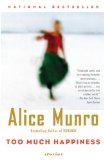Summary | Excerpt | Reading Guide | Reviews | Beyond the Book | Read-Alikes | Genres & Themes | Author Bio

Stories
by Alice MunroThis article relates to Too Much Happiness
Munro's stories often contain mysterious elements that deepen their appeal, leaving the reader with something extra to savor, like a fine mint after an especially flavorful dinner. No story in the collection better exemplifies this than "Too Much Happiness," a tale brimming with sadness that nonetheless ends in ecstasy. The chemical origins of that ecstasy begin when the doctor on the train gives her a pill, saying only "'This will give you a little rest if you find the journey tedious.'" Suffering from a sore throat and nagging cough, Sophia finally takes the pill that not only lessens tedium but also makes her feel "as if her heart could go on expanding, regaining its normal condition, and continuing after that to grow lighter and fresher and puff things almost humorously out of her way."
 MDMA (usually called by its street name, Ecstasy) wasn't synthesized until 1912, and "Too Much Happiness" ends with Sophia's death in 1891, so it can't be the doctor's remedy. Or can it? The effects that Sophia experiences - euphoria, heightened perception, a sense of well-being - certainly match those of MDMA, a compound that uniquely combines the qualities of a stimulant, a hallucinogen, and an entactogen (a drug that encourages feelings of openness and empathy). Until MDMA was made illegal in the United States in 1985, it enjoyed a reputation as a potentially liberating, albeit unorthodox, component of certain kinds of therapy, and some doctors still believe that it holds promise for treating post-traumatic stress disorder.
MDMA (usually called by its street name, Ecstasy) wasn't synthesized until 1912, and "Too Much Happiness" ends with Sophia's death in 1891, so it can't be the doctor's remedy. Or can it? The effects that Sophia experiences - euphoria, heightened perception, a sense of well-being - certainly match those of MDMA, a compound that uniquely combines the qualities of a stimulant, a hallucinogen, and an entactogen (a drug that encourages feelings of openness and empathy). Until MDMA was made illegal in the United States in 1985, it enjoyed a reputation as a potentially liberating, albeit unorthodox, component of certain kinds of therapy, and some doctors still believe that it holds promise for treating post-traumatic stress disorder.
A much more prevalent drug at the end of the 19th century was morphine, a powerful painkiller derived from opium poppies. Heroin, first synthesized from morphine in 1874, did not become widely available until 1898. Nevertheless, a doctor, especially a German doctor (most of these drugs were synthesized by German chemists employed by pharmaceutical companies like Merck and Bayer), might have had access to heroin, and the language that Sophia's travel companion uses to describe the enigmatic tablet (it provides "a little rest" and "solace") does evoke typical reactions to narcotics.
Whatever this drug may be, in this instance it causes Sophia no ill after-effects; on her arrival in Stockholm, she delivers a lecture and then attends a party, although she soon leaves, "too full of glowing and exceptional ideas to speak to people any longer." From there, her health deteriorates and she becomes disoriented yet remains keenly aware of "a movement back and forth…a pulse in life."
Filed under Medicine, Science and Tech
![]() This "beyond the book article" relates to Too Much Happiness. It originally ran in November 2009 and has been updated for the
November 2010 paperback edition.
Go to magazine.
This "beyond the book article" relates to Too Much Happiness. It originally ran in November 2009 and has been updated for the
November 2010 paperback edition.
Go to magazine.
Your guide toexceptional books
BookBrowse seeks out and recommends the best in contemporary fiction and nonfiction—books that not only engage and entertain but also deepen our understanding of ourselves and the world around us.